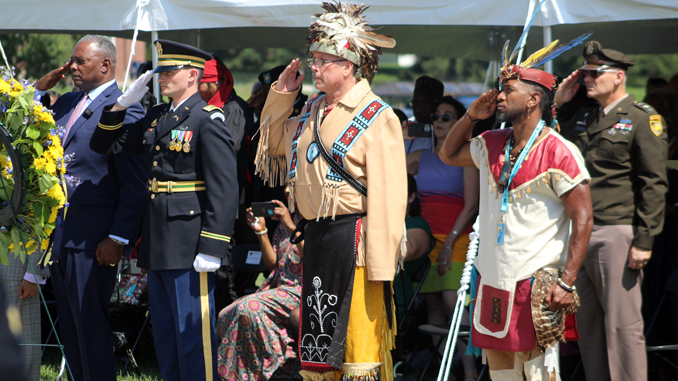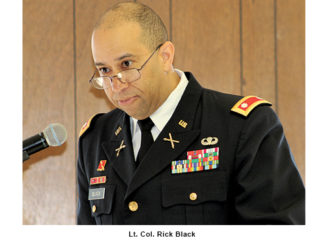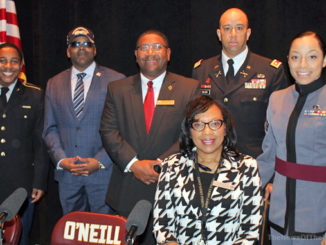
Traditional ceremony held on post attended by many
Under three large tents on Sunday afternoon, several hundred people gathered at the base of the Buffalo Soldiers monument at West Point to pay tribute to soldiers who were instrumental in the US Army for decades.
The short event was the 62nd annual Buffalo Soldier wreath laying ceremony on West Point. Among those attending were dozens of members of the Buffalo Soldiers Motorcycle Club — from three states, it was noted. Also on hand were West Point Superintendent Lt. Gen. Steve Gilland, Buffalo Soldier Association President Dr. Aundrea Matthews, and local leaders including Town of Highlands Supervisor Bob Livsey, Councilman Tyrone King, former Board of Education member Ned Kopald, Cornwall Town Councilwoman Virginia Scott, County Legislator Laurie Tautel and others.
The invocation praised “the high standards of excellence of the Buffalo Soldiers in spite of gross injustice in their day”.
“Today, we are grateful for the memory of the Buffalo Soldiers,” Fr. Matthew Pawlikowski said.
Col. Marcus Wildy, a deputy chief of staff at West Point, was the master of ceremony. He gave a brief history of the formation of the units of soldiers that would come to be known as Buffalo Soldiers.
“On July 28,1866, Congress authorized the creation of six black US Army regiments as part of the military peace establishment in the United States,” Wildy said. “There were four infantry and two cavalry regiments, he said, noting hundreds of black Americans enlisted.”
He added: “throughout the many chapters of our nation’s history, you will find stories about the accomplishments and bravery of the Buffalo Soldiers”, and called them “an important part of the West Point story”.
Guest speaker at the wreath laying was retired Maj. Gen. Barrye L. Price, president and chief executive officer of Community Anti-Drug Coalitions of America. A 31-year Army veteran, he taught military history at West Point.
Price first noted the descendents of Buffalo Soldiers who were in the audience, among the other attendees.
He, too, talked about the “complex” life and legacy of the Buffalo Soldiers, noting it is highlighted by “selfless service and sacrifice within the ranks”. But he added their efforts were sometimes dampened by overt racism throughout both the north and south.
“And yet they served,” Price said, going on to use that phrase several more times as he gave a brief history of America’s struggle with racism.
Following his remarks, the wreath was placed in front of the monument — a structure which bears the likeness of the late Sgt. Sanders Matthews, a Highland Falls resident after his Army service.
There was a 21-gun salute, and Taps was played.
Later in the afternoon, in the much cooler Eisenhower Hall ballroom, the Buffalo Soldiers were again honored at a luncheon. There several speakers talked about the legacy of the soldiers, and some awards were presented.



